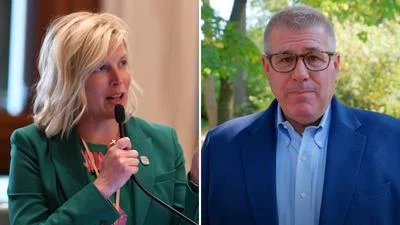State Senator Andrew S. Chesney | Illinois General Assembly
State Senator Andrew S. Chesney | Illinois General Assembly
Lawmakers in Illinois are still in the process of determining the rules for the enforcement of the state's "assault weapon" ban. The Illinois State Police (ISP) recently presented their proposed permanent rules to the Joint Committee on Administrative Rules (JCAR) for consideration. However, action on these rules has been delayed until the January meeting of JCAR, and in the meantime, the temporary emergency rules set by the ISP remain in effect.
The temporary emergency rules include requirements for registering existing weapons that fall under the ban. Owners of banned firearms purchased before January 10, 2023, are now required to file an affidavit with the ISP. However, there is still confusion surrounding which firearms and accessories are banned or require the affidavit.
Critics of the ban argue that it infringes on the Second Amendment rights of law-abiding gun owners and believe that it will ultimately be found to be unconstitutional. They argue that the ban places undue burdens on gun owners with its confusing set of rules. More information on the rules and process can be found on the ISP's website.
While the rules for the ban are still being debated, there are several court cases pending over the constitutionality of the ban. It remains to be seen how these cases will impact the enforcement and implementation of the ban.
In other news, Senator Andrew Chesney recently presented the Scales Mound High School Trap Team with a $500 scholarship. The scholarship, made available by the Illinois Legislative Sportsmen’s Caucus, aims to support the program and the activities it promotes, such as hunting, fishing, trapping, and wildlife management. Trap shooting is a sport enjoyed by many sportsmen and women in Illinois, and the scholarship will help the team purchase ammunition and jerseys.
In the education sector, twenty-six school districts in the 45th District have been awarded a share of $1.4 million in public library grants. The grants, announced by the Secretary of State's office, will support student learning by providing financial assistance for resources and services such as library books, e-books, audiobooks, and technology. The grants are distributed based on enrollment, with each school receiving $0.885 per student.
Pro-life advocates in Illinois have achieved a significant milestone in their fight to keep crisis pregnancy centers operating in the state. They have reached a proposed agreement with Illinois Attorney General Kwame Raoul to halt the enforcement of a controversial law, Senate Bill 1909, which aimed to root out "bad actors" in the crisis pregnancy industry. The law had faced criticism for being unnecessary and potentially unconstitutional. A federal judge had temporarily blocked its enforcement, calling the law "both stupid and very likely unconstitutional."
In a move to support volunteer firefighters and EMTs, eligible emergency volunteers in Illinois will now receive a $500 non-refundable income tax credit starting next year. This tax credit aims to help volunteers cover the costs of training and equipment. To qualify for the credit, individuals must meet certain criteria, including serving as a volunteer emergency worker for at least nine months during the taxable year and not receiving compensation for services exceeding $5,000.
The Illinois Department of Natural Resources (IDNR) has partnered with professional fishermen to address the issue of invasive carp in the Illinois River. In a recent effort, they caught over 700,000 pounds of silver carp within a span of 10 days. This program aims to control the population of invasive carp and protect the Great Lakes from further infestation. Annually, over one million pounds of invasive carp are removed from the Upper Illinois River under the supervision of IDNR staff.
Lastly, the primary firearm season for deer hunting in Illinois has concluded with a total harvest of 76,232 deer. While this number is slightly lower than last year's harvest, there are still opportunities for late-winter and chronic wasting disease (CWD) season hunting in designated counties, as well as continuing archery deer hunting through January.
As lawmakers continue to work on the enforcement rules for the "assault weapon" ban, it remains a topic of debate and uncertainty. The outcome of the court cases and the finalization of the rules will ultimately determine how the ban is enforced in the state of Illinois.
To learn more, click on this link: https://senatorchesney.com/rules-for-enforcement-of-assault-weapons-ban-remain-in-flux/




 Alerts Sign-up
Alerts Sign-up